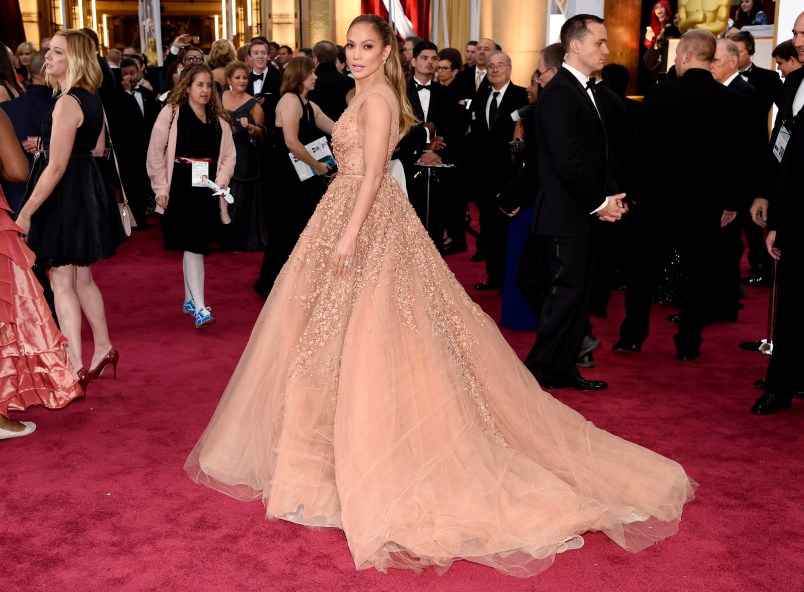Last night at the Oscars, Jennifer Lopez, the Latina singer and actress from the Bronx reportedly worth $300 million dollars, cheered enthusiastically for women’s wage equality (women still make around 77 cents on the dollar). J. Lo has never been considered a feminist by the media; indeed, she’s never even been subject to the obligatory “Are you a feminist?” question every reporter asks female stars nowadays. But even though this may have been Lopez’s only public moment as an arbiter of women’s equality, it certainly wasn’t her first foray into gender equality. J. Lo has been a stealth feminist all along.
It’s not entirely clear how she got seated in first class next to legendary actress Meryl Streep. It wasn’t a belated homage to her role in Maid in Manhattan, or because she gave a blockbuster performance in this year’s thriller, The Boy Next Door. And it certainly wasn’t in recognition of her ill-advised ode to fatties with Iggy Azalea. But there she was, sitting in the Rolls Royce of Oscar seats next to Streep, her new best friend.

Photo via Instagram
Amid crowd scan after crowd scan, the camera kept finding its way to Lopez and Streep, capturing a whisper here and a chuckle there. Normal, obligatory Oscar crowd behavior—nothing too aberrant.
And then Patricia Arquette won Best Supporting Actress for her role in Boyhood and said this in her acceptance speech:
To every woman who gave birth to every taxpayer and citizen of this nation, we have fought for everybody else’s equal rights. It’s our time to have wage equality once and for all and equal rights for women in the United States of America.
Streep and Lopez went HAM:
And Twitter went HAM over Streep and Lopez going HAM…well, mostly over Streep:
Meryl Streep is here for equal rights y’all! #Oscars pic.twitter.com/xvlZpTVp4O
— E! Online (@eonline) February 23, 2015
Meryl Streep’s reaction to Patricia Arquette saying “all women deserve equal pay” during her Oscars speech.
— BuzzFeed Community (@BuzzFeeders) February 23, 2015
Meryl Streep was like “YES GIRL! YES! YOU TELL EM!!” pic.twitter.com/lTjhQtjyh3
— Michelle Sarkisyan (@mishe0406) February 23, 2015
Jennifer Lopez has never held the title of Feminist Pop Icon in the way that, say, Madonna or Lady Gaga have. J. Lo has never declared her feminism to the press like Taylor Swift did in August, or have the word “feminist” lit up behind during a performance on stage like Beyonce did at last year’s VMA’s. But that doesn’t mean she’s not a feminist.
Feminism has officially made its way into the American zeitgeist, and J. Lo is a competitive woman, so it’s hard to understand why Jennifer Lopez hasn’t shouted it from the rooftops. But Lopez’s feminism is there. It’s always been there.
Take, for example, her music video from last year, “I Luh Ya Papi,” featuring French Montana, which has garnered more than 65 million hits on YouTube. The video, a through-the-looking-glass version of her real life, begins with Lopez flanked by two girlfriends discussing her upcoming music video with a video director. The director pitches a few tepid ideas: a carnival scene, a zoo scene, a water park scene. Lopez’s friend pipes in: “If she was a guy, we wouldn’t be having this conversation.” Her other friend adds: “No seriously, if she was a dude they would seriously have her up in a mansion with all these half-naked girls.” The skit is a comment on the dearth of options for female pop stars to express their sexuality. “Why do the men always objectify the women in every single video?” her friend asks, bewildered.
The video they settle upon is one where J. Lo gets to play the “man” with half-naked men there for their enjoyment.
When that video dropped earlier last year, some writers chalked it up to opportunism, now that feminism was cool. But she’s been killing it on the feminist front long before Beyonce’s glowing sign at the Grammys. In 2006, Lopez starred in a film called Bordertown, which shed light on the hundreds of women killed in Juarez. Lopez said at the time: “I felt it was really something that was screaming to be talked about and brought to the surface.” Her 2001 chart-topper, “My Love Don’t Cost a Thing,” was a feminist anthem encouraging women to value love and time with their partner over material goods like diamonds rings, cars and cash. Giving birth to twins hasn’t stopped Lopez from developing her empire: a perfume line, endorsement deals, even a book about the challenges of being a mother and artist. Her hustle, she says, comes from her parents: “They showed me that you put your head down and work—you work for a living and then, when you’re making a living, you still don’t stop.”
Lopez’s reaction at the Oscars last night was thrilling and meme-able, but for years now she’s been quietly building her empire, happily living the single life at 45, and repping the ladies the whole way through.
Collier Meyerson is a writer and producer living in Brooklyn.






